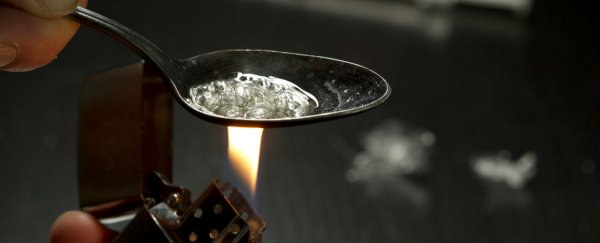Researchers in the US have figured out how to make 'home-made' heroin using a modified form of sugar-fed yeast and an enzyme extracted from poppies, and warn law-enforcement officers that it's only a matter of time before the drug hits the streets.
"We're likely looking at a timeline of a couple of years, not a decade or more, when sugar-fed yeast could reliably produce a controlled substance (such as morphine)," lead researcher and bioengineer John Dueber, from the University of California, Berkeley, told John Ross at The Australian. "We need to be out in front so that we can mitigate potential abuse."
Dueber and his team came up with the 'recipe' when they discovered that a certain type of enzyme can turn glucose sugars into morphine, and have for the first time successfully expressed it in a simple form of genetically engineered yeast. While their intention was to develop new types of cheaper, more effective, and less addictive painkillers, they say that we should now be prepared for this knowledge to be misused, and figure out how to mitigate that.
Previous studies have shown that certain enzymes can successfully convert tyrosine - an amino acid found in glucose, produced naturally by yeast - into the molecule l-DOPA. This molecule signals to the brain to release the 'feel-good' chemical dopamine, which is what you want from a painkiller. But scientists have struggled in the past to make a viable product, because each of these enzymes pushed the reaction too far and destroyed the l-DOPA before it could be of any use.
Now, publishing in Nature Chemical Biology, the team reports that they've found the perfect enzyme for the job. They describe how an enzyme was extracted from the sugar beet (Beta vulgaris), and through a series of genetic modifications, was able to produce the reaction without destroying the l-DOPA molecules. By adding a few more enzymes, including one extracted from the opium poppy, the team managed to produce reticuline, an opiate precursor.
Another paper published recently in PLoS ONE outlines how the process to convert this precursor into a usable form of opiate can be completed entirely in yeast - something that's proven impossible till now. And the prospect of opiates being produced by simple strains of yeast, rather than highly regulated and difficult to grow poppy plants, is pretty scary. Michael Le Page explains at New Scientist:
"It might take many more years to produce a high-yielding strain. But once it exists, in theory anyone who got hold of it could make morphine in their kitchen using only a home-brewing kit. Merely drinking tiny quantities of the resulting brew - perhaps as little as a few millilitres - would get you high. 'It probably is as simple as that,' says Dueber. 'The beer would have morphine in it.'""
So I guess the message here is, it's important to learn from this awesome science, and it will hopefully lead to better medications for those who need it, but seriously, don't try this at home.
